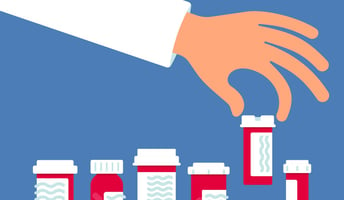Are Antipsychotics Equally Effective for Acute Schizophrenia?
 Among seven commonly prescribed antipsychotics, olanzapine and risperidone might be the most efficacious for treating acute schizophrenia symptoms, according to findings from the Schizophrenia in Non-Occidental Participants (SINO) clinical trial published today in The American Journal of Psychiatry. Olanzapine was also associated with more weight gain and risperidone with more prolactin buildup than the other tested medications.
Among seven commonly prescribed antipsychotics, olanzapine and risperidone might be the most efficacious for treating acute schizophrenia symptoms, according to findings from the Schizophrenia in Non-Occidental Participants (SINO) clinical trial published today in The American Journal of Psychiatry. Olanzapine was also associated with more weight gain and risperidone with more prolactin buildup than the other tested medications.“Whether there are efficacy differences between antipsychotics is the most debated aspect, and major national treatment guidelines make vague statements in this regard,” wrote Guorui Zhao, B.Med., of Peking University Sixth Hospital in Beijing, China, and colleagues. “These evidence-based insights from the SINO trial address critical gaps in acute-phase schizophrenia pharmacotherapy and provide actionable guidance for optimizing treatment algorithms in clinical practice.”
The SINO investigators enrolled 3,067 adults ages 18 to 45 who had been hospitalized for an acute exacerbation of schizophrenia. The patients—all of Han Chinese ancestry—were randomly assigned six weeks of treatment with one of seven antipsychotics: aripiprazole, olanzapine, quetiapine, risperidone, ziprasidone, haloperidol, or perphenazine. (Haloperidol and perphenazine are first-generation medications.) The patients remained hospitalized for the duration of the study.
After six weeks, olanzapine and risperidone resulted in the greatest overall reduction in schizophrenia symptoms (assessed by percentage change in Positive and Negative Syndrome Scale total score). In head-to-head comparisons, olanzapine and risperidone were both statistically superior to aripiprazole, quetiapine, and ziprasidone; they did not reach statistical superiority to the two first-generation medications.
In terms of side effects:
- Olanzapine (9%) and quetiapine (8%) had much lower rates of extrapyramidal symptoms than the other five medication (26 to 55%).
- Risperidone had the highest rate of hyperprolactinemia (95%), while aripiprazole had the lowest (10%).
- The risk of weight gain with olanzapine was about 1.5 to three times higher than with the other antipsychotics; aripiprazole and ziprasidone had the lowest risks for weight gain or other metabolic side effects.
- Aripiprazole also had the lowest rate of sedation (4%).
Despite the higher risk of side effects, olanzapine and risperidone were associated with the lowest rates of treatment discontinuation among patients.
Zhao and colleagues noted that the scope of their findings may be limited since they only assessed younger Chinese patients with acute illness. However, many of their results corroborate previous trials done in other populations, such as the European First-Episode Schizophrenia Trial (EUFEST).
For related information, see the Psychiatric News article “Which Antipsychotics Are Best for Your Patients?”
(Image: Getty Images/iStock/DragonImages)





